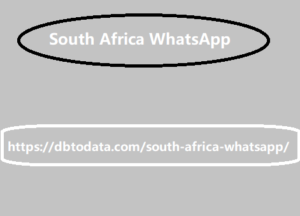### Understanding Korea’s Dialing Code System
In our interconnected world, where communication spans across continents with the touch of a button, understanding dialing codes is crucial. South Korea, a dynamic and technologically advanced nation, utilizes a well-structured dialing code system that facilitates seamless communication both domestically and internationally. This article delves into the intricacies of Korea’s dialing codes, exploring how they function and their significance in today’s global communication landscape.
#### Background and Overview
South Korea, officially known as the Republic of Korea (ROK), is located in East Asia on the southern half South Africa WhatsApp Number of the Korean Peninsula. With a population exceeding 51 million people, South Korea is a hub of economic growth and technological innovation, boasting one of the world’s most advanced telecommunications infrastructures.

The dialing code system in South Korea is part of the broader international system managed by the International Telecommunication Union (ITU). This system ensures that every country and region has a unique identifier for telecommunications purposes, enabling efficient routing of calls and messages across borders.
#### National Dialing Code
The national dialing code for South Korea is **+82**. This code is essential for making international calls to South Korea from anywhere in the world. When placing an international call to South Korea, the caller must first dial their country’s international dialing code (e.g., 00 in many countries) followed by 82 and then the specific area code and local number.
#### Area Codes in South Korea
In South Korea, area codes (also known as city codes) are used to specify different regions within the country. These area codes precede the local phone number when making domestic calls within South Korea. Each area code corresponds to a specific geographic area, and they are assigned based on administrative divisions.
1. **Seoul**: The capital city of South Korea, Seoul, has the area code **02**. It is the largest and most populous city in the country, serving as a major cultural, economic, and political center.
2. **Busan**: South Korea’s second-largest city, Busan, uses the area code **051**. Located on the southeastern coast, Busan is a bustling port city renowned for its beautiful beaches and vibrant cultural scene.
3. **Incheon**: Incheon, a major port city adjacent to Seoul, has the area code **032**. It is known for its international airport and strategic importance as a gateway to South Korea.
4. **Daegu**: Daegu, located in the southeastern part of the country, uses the area code **053**. It is a center of manufacturing and textile industries in South Korea.
5. **Daejeon**: Daejeon, known for its research institutes and universities, has the area code **042**. It is often referred to as the “science city” of South Korea.
6. **Gwangju**: Gwangju, in the southwest, uses the area code **062**. It is a cultural and artistic hub, known for its vibrant arts scene and historical significance.
7. **Ulsan**: Ulsan, with the area code **052**, is a major industrial city known for its shipbuilding and automotive industries.
These are just a few examples of South Korea’s area codes, each representing a distinct region with its own cultural, economic, and administrative characteristics.
#### Mobile Phone Codes
Mobile phones in South Korea also have specific codes that differentiate between mobile service providers. The most common mobile prefixes include **010**, **011**, **016**, **017**, and **018**, followed by the subscriber’s unique number. These prefixes are crucial for routing calls to mobile phones within South Korea.
#### International Dialing from South Korea
When dialing internationally from South Korea, residents and visitors must first dial **001** followed by the country code, area code (excluding the initial zero, if applicable), and local number. This ensures that calls are properly routed to the desired international destination.
#### Future Developments and Considerations
As telecommunications technology continues to evolve, so too will South Korea’s dialing code system. The proliferation of mobile phones, internet-based communication platforms, and digital networks underscores the importance of maintaining an efficient and adaptable dialing code infrastructure.
In conclusion, understanding South Korea’s dialing code system is essential for anyone seeking to communicate effectively within or to and from the country. Whether for business, tourism, or personal connections, these codes facilitate seamless communication across borders and contribute to South Korea’s reputation as a leader in global connectivity.
As we look ahead, advancements in telecommunications will likely bring further changes and enhancements to dialing systems worldwide, reinforcing the critical role of these codes in our interconnected world.
By exploring the intricacies of South Korea’s dialing codes, we gain insight into how technology and communication intersect to shape our global landscape, fostering connectivity and collaboration on a truly international scale.


